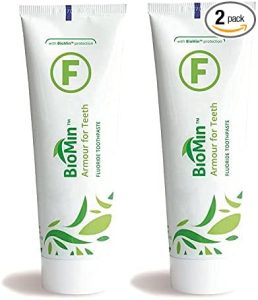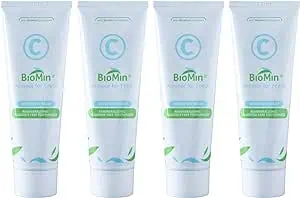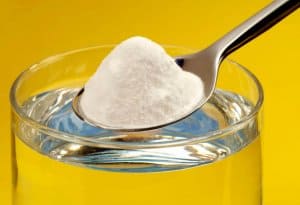If you’ve experienced enamel loss, cavities and decay, you may be wondering how to remineralise teeth and repair enamel to avoid further damage to your teeth.
Unfortunately, we don’t have a magic solution that can regrow teeth or grow back enamel damaged by decay. However, there are ways to naturally strengthen teeth and remineralise enamel:
- Tweaking your diet
- Cut out food with phytic acid in itp
- Adopting a few healthy habits
- Using a remineralizing toothpaste
- Home remedies that can help remineralise and strengthen teeth
Of course, the number one way to care for your teeth is a good oral hygiene routine. But, if you’re doing everything right, but are still experiencing poor oral health and tooth decay keep reading. We are going to discuss a few things that might help you strengthen your teeth.
In This Article
How to restore tooth enamel naturally with remineralisation

When it comes to keeping teeth healthy, you know the drill: brush twice a day, floss, and limit sugary snacks. So, it’s frustrating when, after following all this advice, you still get tooth decay or notice your teeth becoming see-through. What could you possibly be doing wrong? It could be that you’re thinking about tooth re-mineralization.
People often ask “Does enamel grow back?” and “Can you regrow tooth enamel?”. The short answer to these questions is ‘no’ – enamel damaged by decay can’t just grow back. However, it is possible to restore the minerals in weakened enamel and make your teeth more resilient to decay. This process is known as ‘remineralisation’.
Let’s discuss what is weakening your teeth, and the best ways to remineralise and strengthen teeth naturally.
Use a remineralising toothpaste

The easiest step to take is to start using a special remineralising toothpaste to strengthen your teeth. Sensodyne Repair & Protect is a good budget option, containing calcium and fluoride to protect and remineralise teeth.
A more advanced brand of remineralising toothpaste that’s still quite easy to find on the high street is Regenerate Advanced. The special NR-5 formula has been clinically proven to reverse early enamel erosion and remineralise the teeth.
Regenerate also offer this tooth enamel repair kit which includes the toothpaste plus their Advanced Enamel Serum. An intensive remineralizing gel that you use in the mouthpiece provided for just three days a month.
Hydroxyapatite toothpaste
Hydroxyapatite is a type of calcium that occurs naturally in your body. This mineral comprises almost 70% of your bones and is also the main mineral present in your tooth enamel. When your dentist tells you that you have weak enamel, they mean is that it has lost hydroxyapatite molecules.

The innovative technology in remineralizing toothpaste involves strengthening teeth with calcium-rich hydroxyapatite, or a fluoride-enriched version called fluorapatite.
BioMin is one brand making it easy to protect and strengthen your enamel in this way. Their BioMin F toothpaste serves the dual purpose of remineralizing teeth and also relieving sensitivity.
BioMin F remineralizing toothpaste contains low levels of fluoride which is released slowly over a period of 10-12 hours. This makes it different to most toothpastes which have higher levels of fluoride but release it less effectively, so within a couple of hours of brushing you have lost all benefit. By using BioMin, you’re keeping your teeth protected throughout the day and giving your enamel more time to repair itself.
You might consider this a premium toothpaste, since it costs quite a bit more than Sensodyne. However, it’s a price many reviewers are happy to pay for the results it gives. One comments:
“I had been using Sensodyne, which I found was doing nothing to help my sensitive teeth. This, however, does the job. More expensive than an average toothpaste – and worth every penny.”
-Bill, Amazon reviewer
Fluoride toothpaste benefits
Hydroxyapatite might be the building blocks for your teeth, but then fluoride is the cement that holds the blocks together.
There are two reasons why fluoride toothpaste is the best remineralizing toothpaste for enamel repair: it prevents the loss of minerals from enamel and prevent cavities, and it helps incorporate the hydroxyapatite particles into the teeth when used in combination.
The short video below demonstrates the dramatic level of protection that fluoride toothpaste gives. It could be a good one to show your kids if they are protesting about brushing properly.
Fluoride-free remineralizing toothpaste
If you prefer to avoid fluoride, here are a few fluoride-free kinds of toothpaste that still include ingredients for remineralizing teeth.

First of all, BioMin C is one of the best fluoride-free remineralizing kinds of toothpaste. Similar to the fluoride version mentioned above, its special bioactive particles bond to the surface of your teeth to reduce sensitivity and remineralise enamel. It gives long-lasting protecting that’s scientifically proven, without using fluoride.
If you’d like to whiten your teeth as well, try Splat Biocalcium remineralizing toothpaste. This helps strengthen enamel, reduce sensitivity, and also whiten teeth gently. It contains hydroxyapatite and sodium bicarbonate (baking soda), as well as calcium.
Another popular option is Pearlie White Active Remineralisation Toothpaste. This contains hydroxyapatite microparticles and xylitol to naturally remineralise tooth enamel. As well as being fluoride-free, it also contains no SLS, which is another ingredient some people like to avoid in toothpaste.
The whitening effect comes mainly from the tooth remineralisation process, and the gentle stain removal it provides.
Try Xylitol
Xylitol is a natural sweetener that comes from the birch tree. In addition to sweetening up your everyday foods, xylitol is also considered an important substance to remineralise teeth and protect the enamel. Xylitol helps maintain good dental health in a number of ways:
- Kills bacteria by starving them to death
- Greatly increases the absorption of calcium
- Raises the pH of saliva making it more favourable for remineralisation
Xylitol is found in some toothpaste (see below) and can also be taken as a supplement. Talk to your dentist about how much xylitol you can safely consume to remineralise teeth in the fastest way possible.
Avoid foods with phytic acid
During the 1930s, a famous dentist named Weston Prince set out to study the dental health of people living in remote areas with little or no contact with civilisation. The dentist was astonished to discover how most of these people had good oral health with very rare cases of tooth decay and dental caries.
As he investigated, he stumbled upon the common theme. They all ate a diet loaded with whole foods like fatty meat, wild-caught fish, vegetables and fruits, and whole-milk dairy products. They also avoided certain grains and legumes.
What is so wrong with grains and legumes? Despite being very healthy, whole grains are rich in phytic acid, a known “anti-nutrient” that binds itself to minerals present in the body such as zinc, calcium, and iron which prevents their absorption. So, the more grains you eat, the more phytic acid your body acquires which ultimately causes damage to the tooth enamel and increases the chances of tooth decay.
If your goal is to remineralise teeth and protect your enamel, you can try going legume and grain-free for some time to reduce phytic acid levels in the body and give it a chance to absorb all the primary minerals. While you do this, here are some great foods to include in your diet:

- Grass-fed meats
- Pastured eggs
- Wild-caught fish
- Healthy fats from coconut oil and grass-fed butter
- Organic vegetables
Of course, before making any drastic changes to your diet, it’s always best to consult with your physician.
Heal your gut with probiotics
Consuming mineral-rich foods is not the only way to strengthen and remineralise your enamel. There are many other things that you may consider adding to your diet for a healthy mouth; one of which is probiotics.
Probiotics are the good bacteria present in your gut which not only protect your digestive system but can also reverse tooth demineralization and prevent cavities. This may not come as a surprise, especially after the release of studies like this one that demonstrates how almost every disease in the body can be linked to gut issues.
But why should you include probiotics as a part of your oral care? What part do they play in remineralizing teeth and enamel repair?
Probiotics decrease the number of mutans streptococcus, a kind of bacteria found in the mouth that plays a primary role in tooth decay. Additionally, they also keep your gut healthy which means it is better able to absorb the majority of nutrients and minerals.
According to recent studies, the following probiotic strains can help you maintain healthy teeth:
- Lactobacillus reuteri
- Lactobacillus salivarius
- Bifidobacterium animalis
- Lactobacillus rhamnosus
Remember to include a high-quality probiotic supplement with the above-mentioned strains in your daily diet if you want to strengthen teeth.
Take the right vitamins for teeth
Vitamin D is an important nutrient, not only for your dental health but also for other body systems. It helps the body to absorb calcium which strengthens the joints, bones, and – you guessed it – teeth. While most of us are well aware of its importance, not many people make sure to get enough of this vitamin.
Scientists have found that supplementing your body with vitamin D can greatly reduce the likelihood of getting cavities. You may also consider taking vitamin K2 after seeking appropriate medical advice as it considerably enhances the absorption of vitamin D.
Read about recommended vitamin intakes from the NHS here.
Use baking soda
Baking soda is an extremely popular and effective home remedy to whiten teeth. It has even been recommended by dentists as a safe natural alternative to commercial teeth whiteners. But did you know that baking soda can also help you prevent cavities and maintain good oral hygiene?

What’s more, baking soda also reduces acidity in the mouth which may otherwise disrupt the layer of minerals naturally deposited on the enamel of a tooth. A reduced acidity level makes it easier for fluoride toothpaste to remineralise and rebuild the enamel, too.
So if you think your teeth need a quick remineralisation, all you need to do is mix one tablespoon of baking soda with 120ml of water and swish it around your mouth once a day.
Perform coconut oil pulling
Oil pulling is a famous Ayurvedic practice that not only strengthens the gums and teeth and freshens the breath but also helps remineralise teeth and prevent tooth decay. Numerous studies have proven that using oil can clear away the harmful bacteria, such as streptococcus mutans, which normally reside in the saliva and plaque.
Just take one tablespoon of coconut oil and swish it in your mouth for 20 seconds per day. The traditional Ayurveda recommends using sesame oil but for most people, coconut oil is a better choice as it has a better taste. We have a separate article which explains more about how oil pulling works and how to do it, if you’d like to give it a try.
How does tooth remineralisation help?
Now that you know how to remineralise teeth in the most effective ways possible, you must also understand why it is so important.
The biggest reason why you should remineralise teeth is that it helps reverse tooth decay and reduces the likelihood of cavities. But that’s not the only benefit. Teeth remineralisation can also:
- Decrease tooth sensitivity
- Control dental pain
- Improve overall oral hygiene
- Restore the functions of damaged teeth
- Cut down lifetime dental costs
Plus, it also positively impacts your overall health and may markedly improve your quality of life.
Optimising enamel repair

Switching your toothpaste is a great start, but we’ve mentioned lots of other small changes you can make to help strengthen your teeth. If you’re taking it really seriously, here are certain things that you can do to maximise tooth remineralisation and fight off cavities:
Do not dabble
Be in control of your dental health by forming habits that automatically promote remineralisation. Instead of searching for a quick fix, find sustainable solutions that you may adapt to your lifestyle.
Begin early
Habits that promote remineralisation also play an important role in the healthy formation of both temporary and permanent teeth. So, it is better to start early rather than wait until you already have cavities.
Stay hydrated
Hydration plays an important role when it comes to producing saliva, which is an important defence against plaque and cavities. Therefore, drink at least eight glasses of water every day to help avoid dry mouth and aid enamel repair.
Live healthily
Get enough sleep, control your stress levels, and exercise on a daily basis. These three factors not only promote the general health of the body but also have an indirect effect on your teeth by regulating hormones and running all the body’s systems effectively.

Cheat strategically
Even if you decide to have cheat days, do it strategically. For example, if you wish to drink a can of acidic soda that severely hampers the remineralisation process, try finishing it quickly instead of sipping on it throughout the day.
Talk to your dentist
Even if you wish to stick to natural remedies to mineralize your teeth, do not forget to stay in touch with your dentist. Your dentist can help you with tracking your progress and documenting your results in addition to helping you gain access to products you may not find over-the-counter.
How to strengthen teeth: conclusion
Your teeth are an important part of your body and require constant remineralisation. Your saliva naturally does a lot of the work for you, but sometimes we need to give our teeth a boost. The enamel repair strategies outlined in this article can all help strengthen your teeth and improve your long-term oral health. A remineralizing toothpaste for sensitive teeth is an easy place to start.
Here’s a summary of the things you can do to remineralise your teeth.
Oral hygiene | Diet | Lifestyle |
Baking soda rinse | Foods low in phytic acid | Get enough sleep |
Remineralizing toothpaste with fluoride | Organic vegetables | Exercise a little bit every day |
Incorporate xylitol into your routine | Healthy fats | Drink 8 glasses of water every day |
Don’t forget to keep in touch with your dentist to track progress and keep a check on the results.
FAQs
Can you regrow teeth enamel?
It’s not possible to restore or regenerate enamel because it’s a non-organic tissue that lacks the ability to grow. There is no other source of enamel in the body that can be used for grafting. However, tooth enamel that has been mildly damaged by demineralization can be repaired with some careful attention.
What can I eat to remineralise my teeth?
Foods rich in calcium, such as almonds, cheese, milk, and leafy green vegetables, can all help with tooth remineralisation. Phosphorus-rich foods can also help. This includes foods like eggs, fish, and non-processed meat.
Can baking soda remineralise teeth?
While baking soda does not directly mineralize teeth, it may aid by reducing acidity in the mouth. This is because a higher level of acidity can disrupt the natural layer of minerals on the enamel. A reduced acidity level also makes it easier for fluoride toothpaste to remineralise and rebuild the enamel.
Can you reverse tooth decay?
It is possible to reverse this in the early stages with the help of different remedies like baking soda, fluoride remineralizing toothpaste, and probiotics, but this is not a guarantee. If the process of tooth decay continues, more minerals keep getting lost, weakening the enamel, deepening the cavity, and causing tooth pain. At this stage, the cavity becomes irreversible and enamel repair requires a filling.
Annali di stomatologia. Nano-hydroxyapatite and its applications in preventive, restorative and regenerative dentistry: a review of literature. Consulted 26, January 2020.
Journal of Indian Society of Pedodontics and Preventive Dentistry. Effect of oil pulling on Streptococcus mutans count in plaque and saliva using Dentocult SM Strip mutans test: a randomized, controlled, triple-blind study. Consulted 26th January 2020.
Nutrition reviews: Vitamin D and dental caries in controlled clinical trials: systematic review and meta-analysis. Consulted 26th January 2020.
Caries Research. Effect of long-term consumption of a probiotic bacterium, Lactobacillus rhamnosus GG, in milk on dental caries and caries risk in children. Consulted 26th January 2020.
Oregon State University: Gut bacteria’s connections to human health, disease. Consulted 26th January 2020.
Journal of electron microscopy. Remineralization effects of xylitol on demineralized enamel. Consulted 26th January 2020.
NCBI: Remarks on THE INFLUENCE OF A CEREAL-FREE DIET RICH IN VITAMIN D AND CALCIUM ON DENTAL CARIES IN CHILDREN. Consulted 20th March 2020.




